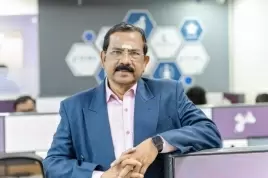‘Media and judiciary, both could be vindictive’
27-May-2013
Vol 4 | Issue 21
Justice K Chandru, former judge of the Madras High Court, lamented the fall in ethical standards of the media and the judiciary, while sharing his personal observations as lawyer and later as judge at Madras High Court.
Presiding over The Weekend Leader’s Friends of Positive Journalism Conclave at Chennai on Saturday, Chandru recalled the dreary days of the early 1970’s when journalists covering the court just reported final judgments.
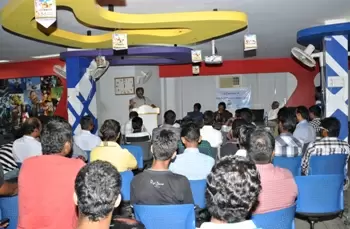 |
|
Justice K Chandru addressing the FPJ Conclave in Chennai (Photos: Media Ramu)
|
They did not report trial proceedings or even interim judgments. In those days reporters did not have proper facilities in the court.
During the Emergency, media freedom was severely restricted.
Post-emergency, newspapers infused young blood and it was this crop of young reporters who started questioning old methods of court reporting.
Chandru said in 1970s, peons attached to the judges in Madras High Court were not allowed to wear footwear in the court and the issue was raised by a reporter from Indian Express. The peons came to the court wearing footwear, but did not use it during duty hours.
Nobody knew who had enforced such a rule at the court, which defended human rights and dignity of people.
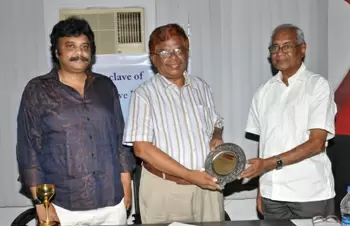 |
|
The Weekend Leader's Consulting Editor Sam Rajappa (right) presents a memento to Justice Chandru as FPJ Chairman P Saravanaraja looks on
|
A journalist from Indian Express took up the matter with the court. He was told that the government has been informed of the situation and the peons would be soon supplied with footwear.
But the persistent reporter questioned why the peons were not being allowed to wear their own footwear in court. For the first time the court faced a situation when a reporter was asking inconvenient questions.
Chandru recalled the days when even district judges used to travel with commoners in public buses. It became news when a district judge was held by the police for travelling on footboard.
Later, the court organized two buses for transporting judges, but the buses were lying unused in the court premises.
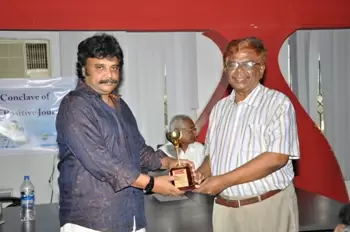 |
|
Justice Chandru presenting memento to Saravanaraja
|
A reporter questioned why the buses were not being used. The court was angry with the reporter for raising such a question, which was not directly related to judgments or functioning of the court, said Chandru.
Reports also started appearing in the media on lack of sufficient toilets for litigants and visitors to the court, as reporters started looking for stories beyond the courtrooms.
Members of the media soon got a separate room in the court premises with phone, fans, chairs, and other facilities.
Chandru said in later years the media started reporting sensational news, and reported cases before they were filed in the court. Journalists began to quote their advocate friends and lawyers started cultivating the media.
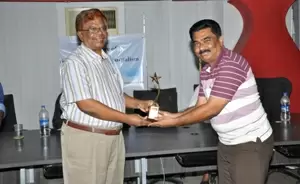 |
|
Siva Ilangovan receiving memento from Justice Chandru
|
The media showed interest in covering news relating to cinema stars. Whenever cases concerning film stars came before family courts, the media reported it unmindful of the fact that it was unlawful to report proceedings in family courts.
“What happens in the family court cannot be reported because proceedings are in camera. But the media still publishes the news,” he said.
He said actress Suganya filed a case against the media for reporting her case that had come before the family court when she filed a divorce petition.
The Madras High Court granted her relief, but the media turned vindictive against her and stopped giving her any coverage thereafter, he said.
Chandru did not spare the judiciary either and cited the court’s reaction when the media reported on the sales tax exemption given by the state government on the Honda City cars purchased for the judges.
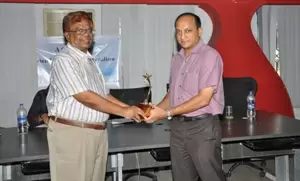 |
|
C Rajasekar receiving memento from Justice Chandru
|
Contempt notices were issued to editors of The Hindu and Ananda Viketan on the matter. Later, the charges were dropped, he said.
Justice Chandru presented mementos to Friends of Positive Journalism (FPJ) chairman P Saravanaraja, and members of the FPJ committee, Siva Ilangovan, and C Rajasekar, who had campaigned for increasing the subscribed readership of The Weekend Leader.
Editor P C Vinoj Kumar spoke about the magazine’s vision and said the magazine will continue to be a voice for change agents in the country.
FPJs, students of Arena Animation, Anna Nagar, and journalists attended the function.




